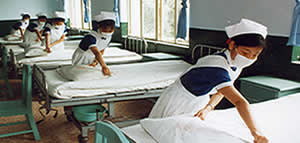Objective 1: "Improve the quality of, and equal access to, basic social services"
The UN system will support the Government of China in its efforts to increase the effectiveness of basic services, concentrating assistance in the areas of basic education and basic health services, including safe water and sanitation.
 Overall
access and coverage of basic social services has improved during the last
two decades with notable progress towards, for example, reduction of infant
and under-five mortality. There is a marked improvement in primary school
enrolment equality between girls and boys, although significant regional disparities
still exist. In addition, emphasis on enrolment rates masks higher non-attendance,
non-completion, late school entry, grade repetition and drop-out rates of
girls. However, in recent years preventive and primary health services such
as immunisations and prenatal care have become increasingly weakened as health
providers cut down on non-profitable services. This worrisome trend has had
a negative impact on child and maternal mortality, and efforts will have to
be made to reverse this and set China back on track in its previous successful
course of reduction. Furthermore, much of the Chinese population, especially
in the poorer areas, remain burdened by major communicable diseases such as
tuberculosis, hepatitis B and vaccine-preventable illnesses. In addition,
new research and data on infant and child mortality, morbidity and access
to medical facilities suggest that girls do not receive the same advantages
in health care as do boys.
Overall
access and coverage of basic social services has improved during the last
two decades with notable progress towards, for example, reduction of infant
and under-five mortality. There is a marked improvement in primary school
enrolment equality between girls and boys, although significant regional disparities
still exist. In addition, emphasis on enrolment rates masks higher non-attendance,
non-completion, late school entry, grade repetition and drop-out rates of
girls. However, in recent years preventive and primary health services such
as immunisations and prenatal care have become increasingly weakened as health
providers cut down on non-profitable services. This worrisome trend has had
a negative impact on child and maternal mortality, and efforts will have to
be made to reverse this and set China back on track in its previous successful
course of reduction. Furthermore, much of the Chinese population, especially
in the poorer areas, remain burdened by major communicable diseases such as
tuberculosis, hepatitis B and vaccine-preventable illnesses. In addition,
new research and data on infant and child mortality, morbidity and access
to medical facilities suggest that girls do not receive the same advantages
in health care as do boys.
Improved management and disease control - UN assistance will place emphasis on improved management, especially on the financing system and budgetary allocations for both the health and education sectors. This will include the development of policies and strategies in order to improve service delivery, and the establishment of risk-pooling mechanisms and effective regulatory measures to control practice and costs so that current allocations, particularly in the health sector, are better utilised. Special attention will be paid to preventive health care, which is an area where the market system cannot provide effective services and to the control of specific diseases, including tuberculosis and sexually transmitted diseases (STD). This will include interventions in developing models to assess the economic and social impact of disease epidemics and to design cost-effective intervention models and to adapt national and local policies in those areas where appropriate disease control policies are still lacking, and bridging the gap between national level policies and pilot activities where good policies exist.
Along with quality and cost-effective service delivery, the UN will assist the Government in targeting, i.e., special efforts to extend equal access of quality basic services to the poor, to women and children and other vulnerable populations. Health education, advocacy and promotion will be carried out as an important part of disease prevention and control. The UN will also support the improved provision of safe water, sanitation facilities, environmental care at the household level and enhanced communication for change of behaviour leading to improved life skills.
Reproductive Health - UN will continue support to the strategy agreed at the ICPD Cairo Conference focussing on qualitative improvements. UN has already intervened successfully in 32 counties, moving towards a modern, voluntary, client-oriented, quality of care approach to reproductive health and family planning. It will continue such interventions in additional counties with strong emphasis on gender and male involvement, adolescent reproductive health and social marketing of contraceptives.
Education - In the area of education, the UN organisations will focus on consolidating the national capacity for quality improvement in Basic Education within the framework of the accomplishment of Education for All (EFA) goals by 2015. Specific interventions will be aimed at increasing primary school attendance rates in minority areas, particularly for girls, and at implementing a higher quality, more child-friendly and girl-friendly educational environment. Accordingly, the government’s plans for long distance education will be supported in order to accelerate the combination of high quality training aids and curricula, in particular in marginal and poor areas.
Improved management of information - To better monitor qualitative progress and improvements in this area, the UN will assist the Government in improved information and data collection, particularly of sex-disagregated data.
HOME
| ABOUT
CHINA | RC
SYSTEM | THEMES
| WORKING
TOGETHER
PARTNERS
| GOALS
| EVENTS
| NEWS | CONTACT
US | SITE
MAP
